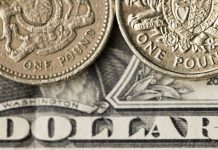You have almost certainly come across the term a strong dollar, but what does it mean? A strong or weak dollar are terms used to describe the value of the US dollar relative to the value of other currencies. Here we will look in more detail at what a strong dollar is and what it means for the stock market, foreign investors, tourists and the US economy as a whole.
 |
What does it mean to have a strong dollar?
A strong dollar means that the US currency has risen to a level that is at or near historically high levels compared to other currencies. It means it can buy more of a foreign currency than before on the foreign exchange markets.
The strength of the dollar can be affected by a whole range of factors including broad supply and demand, the strength of the economy, Federal Reserve interest rate policy and geopolitical events
Let’s look at an example. Supposing the pound US dollar exchange rate, so the value of the pound in relation to the dollar was at $1.80. This would mean that it would cost you $1.80 to buy £1. Now supposing that the exchange rate is $1.10. This means that for $1.10 you can buy £1. In the latter example you need fewer dollars to buy £1. Therefore, the dollar is stronger.
The term “strengthening dollar” refers to the value of the US dollar increasing relative to other currencies. A strengthening dollar will buy more of another currency than it did before.
Weak dollar definition
A weak dollar means that the dollar is trading at or near a historically low level. In other words, the US dollar has a low value relative to other currencies.
A weakening US dollar means that the value of the dollar is declining relative to other currencies. A weakening dollar will buy less of another currency than it did before.
Who benefits from a strong dollar?
USD strength can benefit some and negatively impact others. US consumers have more buying power with a stronger dollar. This is because a strong dollar means imported products and foreign holidays comparatively cheaper. It may also be beneficial for domestically focused stocks; however, multinational companies and exporter firms can suffer under a strong dollar. Let’s take a look in more detail:
What does a strong dollar mean for the stock market?
A strong dollar may negatively impact earnings for companies selling goods and services abroad. When the dollar is stronger, the unfavorable exchange rate hurts the value of their international sales and profits when they have to convert the money back into US dollars. It is not unheard of for big international companies to warn during earning season that a strong dollar is negatively impacting their results. The result is a net reduction in sales and earnings.
A stronger dollar can also be damaging to multinationals in another way. A strong US dollar makes US goods more expensive overseas. This could drive down the demand of a product. When a product is more expensive, it is less competitive, and demand can decline. As a result, sales and sales revenue can deteriorate dragging on the profits of these US multinationals. When a company’s revenues and / or profits fall, investors often sell out of shares in those companies.
What does a strong dollar mean for foreign investors?
If a foreign investor wants to invest in the US and in US assets, they will often consider the value of the dollar. A foreign investor would typically want to see the value investment and the value of the dollar strengthen across the investment period. In this way, when the investment period comes to an end, the foreign investor would look to move back into their local currency at a more favorable exchange rate.
A foreign investor does not want the dollar to weaken during the investment period. In this scenario they would have to subtract from what he earned in order to exchange the money back into the local currency.
This means that the actual level of the dollar shouldn’t matter to the foreign investor. However, expectations of movement of the dollar during the investment period should matter. The foreign investor benefits from an appreciation and suffers from depreciation during an investment period.
What does a strong dollar mean for the tourists?
A strong dollar can have a negative effect on the tourist industry in the US. More specifically it can present headwinds for foreign visitors interested in visiting the United States. If the dollar is very strong, it means that a potential visitor from another country would get fewer dollars for the same amount of their own currency. This difference could mean that travelling to the US becomes too expensive. As a result, these foreign tourists might decide to travel to another county instead which has a weaker currency. This would mean that their own currency goes further. According to an Oxford Economics analysis commissioned by the US Travel Association, a 10% appreciation in the value of the dollar would result in 0.2% fewer international visitors.
If the dollar is strong foreign tourists may still decide to travel to the US, but they may decide to spend fewer dollars or stay fewer days. So, a foreign tourist may stay six days instead of seven, they might stay in a four star rather than a five star or they might move down the restaurant ladder.
However, it is worth noting that the price of consumer goods and services are cheaper in the US when compared to competitors such as Germany, France, UK or Italy. So, despite the weaker exchange rate tourists from those destinations may still find costs in the US relatively cheap in comparison, anyway.
On the other side of the equation, a strong dollar could make travelling abroad more appealing for US nationals. Americans with US dollars can see those dollars go further when they travel to foreign countries. It would give them a greater amount of buying power particularly as local products are unlikely to be influenced by the higher price of the dollar.
Is a strong dollar good or bad for the US economy?
A strong dollar can be a double-edged sword. It can be seen as a positive for US consumers and a negative for US exporters. If the dollar rises too high or the US economy is weak then a strong US dollar can create problems for the US economy. If the US economy is strong, this shouldn’t be the case.
A strong US dollar is beneficial for the US consumer. This is because it reduces the dollar price of imports. In other words, a stronger dollar makes foreign goods cheaper to buy and more affordable to domestic customers. Some domestic industries that compete with those imports could be hurt by the increase in competition. However, in a robust economy with high employment levels this shouldn’t be too much of an issue.
On the other side of the equation a strong dollar hurts US exporter companies. For US companies that export their goods across the globe and derive much of their income from overseas, a strong dollar is a hindrance. These US companies are less competitive compared to their European counterparts, for example. Demand for their products can fall. Consequently, US production would also start to decline. Under this scenario employment levels can fall in exporting firms and unemployment rises. Rising unemployment and signs that it is spilling into other sectors in the US economy can cause US consumers to lose confidence. As consumer confidence falls then consumers are less inclined to spend meaning that the economy can slow.
So, whilst a strong dollar benefits the consumer sector of the economy it only does so whilst the economy remains strong and the dollar doesn’t strengthen so much that US goods are priced out of the market.
Conclusion
A strong dollar is a frequently used term. A strong dollar can buy more of a weaker currency. A strong dollar impacts on various aspects across the US economy, including the stock market, tourism, and foreign investment. A strong dollar is beneficial for the US consumer whilst can be negative for US exporters and multinationals.
To read and learn more about the US dollar and US dollar news, check out our USD news page.
 |





